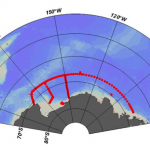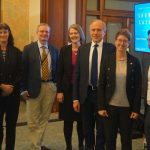 August 3, 2018 10:36 am
Published by Climate Extremes
August 3, 2018 10:36 am
Published by Climate Extremes
As the end of his masters degree approaches, Ewan Short is at a career crossroads. He studied meteorology, and his main choice is whether to pursue a career as an operational forecaster with the Bureau of Meteorology, or do a PhD. An internship with the Bureau of Meteorology was a step on the way to making that decision.
 August 3, 2018 9:25 am
Published by Climate Extremes
August 3, 2018 9:25 am
Published by Climate Extremes
For 67 days from early March to mid May, Taimoor Sohail was aboard the US Antarctic Program icebreaker, the Nathaniel B. Palmer, on a scientific expedition from Hobart to Punta Arenas in Chile. It was relentless but very rewarding work, scientifically and personally.
 August 3, 2018 6:26 am
Published by Climate Extremes
August 3, 2018 6:26 am
Published by Climate Extremes
CLEX Chief Operating Officer Stephen Gray welcomes us all to the first newsletter of the ARC Centre of Excellence for Climate Extremes, celebrates the legacy of ARCCSS and touches on where we are going with open access publications.
 August 3, 2018 3:55 am
Published by Climate Extremes
August 3, 2018 3:55 am
Published by Climate Extremes
Convection was explored in a recent 1-day CLEX workshop held on June 21, 2018, at The University of Melbourne.
 August 3, 2018 3:21 am
Published by Climate Extremes
August 3, 2018 3:21 am
Published by Climate Extremes
In late April, Anna Ukkola (ANU/UNSW) and Malcolm King attended the Australian Academy of Science’s 2018 EMCR forum Science Pathways 2018: Diversify your thinking.
 August 3, 2018 2:10 am
Published by Climate Extremes
August 3, 2018 2:10 am
Published by Climate Extremes
Andréa Taschetto & Alejandro di Luca attended EGU – the largest conference in geosciences in Europe. This year the conference received more than 15,000 participants from 106 countries with over 4,000 talks and more than 11,000 posters during the week of April 8-13, 2018, in Vienna, Austria. Find out the tips and tricks of getting the most out of a major conference.
 July 30, 2018 5:24 am
Published by Climate Extremes
July 30, 2018 5:24 am
Published by Climate Extremes
This is a three-year postdoctoral position focused on high-resolution modelling of extreme rainfall associated with organised convective storms.
 July 30, 2018 4:57 am
Published by Climate Extremes
July 30, 2018 4:57 am
Published by Climate Extremes
A new study by CLEX researchers using observations from FLUXNET sites identifies regions of high and low predictability and will likely help improve land surface model evaluation.
 July 25, 2018 3:00 am
Published by Climate Extremes
July 25, 2018 3:00 am
Published by Climate Extremes
It is hoped this proposed synthesis of two ENSO structures, their interaction with each other and how they respond to external forcing, will be the catalyst for future research and practical applications for forecasting and determining the impacts of present and future ENSO events.
 July 16, 2018 12:26 pm
Published by Climate Extremes
July 16, 2018 12:26 pm
Published by Climate Extremes
This study highlights the importance of simulating global and regional warming responses correctly, to enable more accurate estimates of how the occurrence probability of climate extremes may change in a warming climate.










